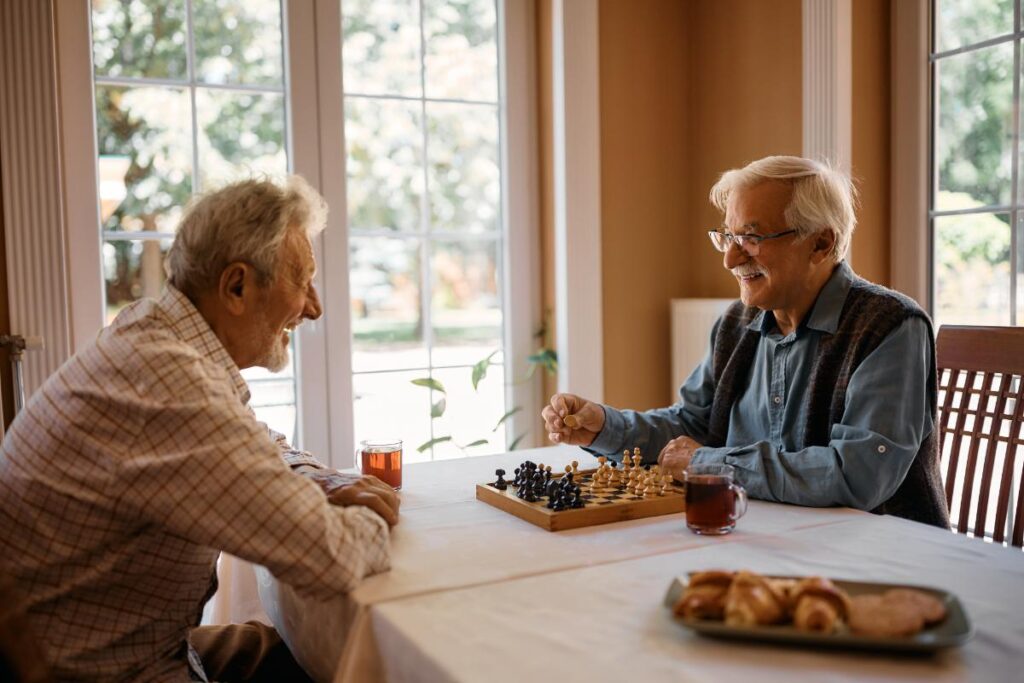The human brain comprises around 100 billion neurons connected with trillions of synapses. That’s a lot of brain power. Brain exercises for seniors can help keep your senior mental health in great shape. Call 214.225.6197 to speak with someone from the caring and compassionate staff at Ventana about senior community activity programs in Texas.
What Are the Best Brain Exercises for Seniors?
The brain, often referred to as a muscle, requires regular exercise to maintain its strength. For seniors, engaging in brain-stimulating activities becomes even more crucial as it can help boost cognitive functions and memory retention. Here are some of the best brain exercises for seniors that provide a little more detail on each:
- Reading – Spend quality time delving into books or articles on topics that pique your interest, allowing your brain to absorb new knowledge and perspectives.
- Puzzles – Challenge yourself with crossword puzzles, jigsaw puzzles, brainteasers, and other mind-teasing activities that keep your brain actively engaged and problem-solving.
- Games – Engage in board games like chess or cards, offering a fun and interactive way to exercise your brain while enjoying quality time with others.
- Writing – Maintain mental agility by keeping up with journaling or writing letters, as these activities require thought and creativity, stimulating your brain.
- Mental Math – Practice counting and solving mathematical problems without relying on calculators or other devices, providing a mental workout for your brain.
- Socializing – Stay connected with friends and family through social media, video calls, or in-person visits, as social interactions play a vital role in keeping your brain active and engaged.
- Taking classes – Stimulate your brain by learning something new, whether it’s a language, art, or cooking. Engaging in educational activities helps create new neural connections and enhances cognitive abilities.
By incorporating these brain exercises into your routine, you can promote mental well-being and maintain cognitive vitality throughout your senior years.
What Are Other Ways to Maintain Senior Mental Health?
There’s more to brain health than doing crosswords and socializing.
Move Your Body
Just 30 minutes of aerobic exercise five times a week can help keep your brain sharp. Researchers have found that regular physical activity increases the size of your hippocampus, a part of the brain crucial to making memories. Physical exercise also generates a chemical called brain-derived neurotrophic factor (BDNF), which acts as fertilizer for the brain, encouraging the growth of neural connections and new brain cells.
Eat a Healthy Diet
A diet high in fat and sugar not only harms your body but also negatively impacts your brain health. Research shows that such diets can increase the risk of cognitive decline. On the other hand, diets that emphasize the consumption of nutrient-rich fruits and vegetables, whole grains, lean meats, fatty fish, and healthy fats are beneficial in reducing this risk. So, making conscious food choices can contribute to maintaining a healthy body and a sharp mind in the long run.
Change It Up
If you enjoy indulging in activities like crossword puzzles, sudoku, or other brain-stimulating games, I encourage you to continue! However, instead of engaging in the same activity day after day, consider adding variety to your routine. While this may not necessarily reduce your risk of Alzheimer’s, it can certainly provide a stimulating workout for your brain and contribute to the improvement of your executive function. By challenging your cognitive abilities through a diverse range of mental exercises, you can further enhance your brain’s overall health and functionality.
Practice Meditation
Researchers think chronic stress may be a risk factor for developing Alzheimer’s. Meditation can reduce stress. Practicing mindfulness meditation for 10 minutes a day may also improve concentration and “working memory”—the ability to keep new information in mind so the brain can work with it briefly and connect it with other information.
Prioritize Sleep
Sleep helps your brain consolidate memories, clear out abnormal proteins, and wake up refreshed and firing on all cylinders. Not getting the recommended seven to eight hours of sleep each night can result in problems with memory and thinking. Lack of sleep may also increase your risk of developing Alzheimer’s.
Quit Smoking
In addition to shortening your life span, smoking increases the risk of dementia and stroke. Studies show that smokers are more likely to experience age-related brain volume loss. Smokers also have an increased risk of dementia.
Remember to Floss
Recent studies found the bacteria that cause gingivitis may also be connected to Alzheimer’s disease. Scientists have previously found that this bacteria can move from the mouth to the brain. Once in the brain, the bacteria release enzymes that can destroy nerve cells, which leads to memory loss and eventually Alzheimer’s.
Find Memory Care for Seniors in Texas at Ventana
We work closely with families to provide personalized care for members living with memory loss. Our Garden View neighborhood offers a structured, supportive setting for members with mild to moderate dementia. Garden View residents enjoy private rooms with round-the-clock support from caring and compassionate staff. Contact Ventana today at 214.225.6197 to learn more about our memory care for seniors in Texas.

